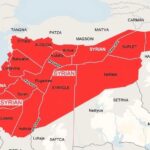Conflicts
Politics
AL JAZEERA, ASSAD, BASHA, BASHAR AL - ASSAD, CONFLICT, EUROPE, HEZBOLLAH, IDLIB, IRAN, KURDISTAN REGION OF IRAQ, MILITARY, MILITARY OPERATIONS, PALESTINE, RUSSIA, STATE, SYRIA, SYRIAN CONFLICT, SYRIAN DEMOCRATIC FORCES (SDF, U. S, UKRAINE, UNITED NATIONS REFUGEE AGENCY, UNITED STATES, WAR, WPR
Nia Simpson
Examining the Complex Legacy of the Syrian Civil War and Its Ongoing Challenges
The Syrian civil war has extended for over ten years, with President Assad gaining military control alongside Iranian and Russian support. Despite a reduction in fighting, tensions persist in regions like Idlib, and the humanitarian crisis remains extensive. Reconstruction efforts are complicated by international reluctance to engage with Assad, raising critical questions regarding Syria’s future and governance post-war.
The Syrian civil war has ravaged the nation for over a decade, reaching a pivotal moment as President Bashar al-Assad consolidates control, backed by Iran and Russia, marking a military victory after the conflict commenced in response to government repression of protests in 2011. Although the intensity of the fighting has diminished, significant regions, notably Idlib, are still contested, and tensions remain due to external influences including the recent Israel-Hamas conflict. The humanitarian impact of the war is profound, with staggering casualties and millions displaced, leading to a complex reconstruction landscape where international funding is sought amid political reluctance. Notably, while regional diplomacy appears to be reinvigorating Assad’s position, the efforts for reconstruction face scrutiny due to ongoing U.S. and European opposition against cooperating with his regime. In this intricate context, questions about Syria’s future arise, particularly pertaining to the accountability for actions taken during the war and the roles played by external actors. While the conflict seems to gravitate toward a conclusion, its legacy continues to shape the lives of countless Syrians and the geopolitical dynamics of the region.
The Syrian civil war, beginning in 2011 as a response to government repression of peaceful protests, has evolved into a complex humanitarian and geopolitical crisis. With the involvement of multiple foreign powers, including the United States and Russia, the conflict has drawn global attention due to its extensive humanitarian ramifications. The war has displaced millions and resulted in significant fatalities, while failed reconstruction efforts highlight the challenges facing Syria in the post-conflict era. This analysis reflects ongoing international relations influenced by the war’s aftermath.
In summary, the Syrian civil war’s convoluted conclusion remains riddled with uncertainty as various factions vie for control and influence in a region marked by ongoing humanitarian distress. Despite some military gains for the Assad regime, the reconstruction process hangs in the balance, hindered by a lack of international cooperation and insufficient funding. The prospect of achieving a sustainable peace in Syria requires not only an end to hostilities but also accountability for past transgressions and a commitment to reform, which currently appears daunting.
Original Source: www.worldpoliticsreview.com








Post Comment